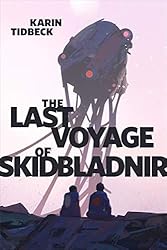Our exploration of free and inexpensive short fiction available on the internet. Here are a few stories we’ve read that we wanted you to know about.

![]() “Slow Victory” by Juanjo Bazan (free at Daily Science Fiction, May 24, 2018)
“Slow Victory” by Juanjo Bazan (free at Daily Science Fiction, May 24, 2018)
A time traveler heads back for a meeting in the woods with a young woman “hiding from the army of uninformed and ignorant men.” Bazan offers up a different take on time travel here, a more intimate, more quiet sort of tale than is often told in this sub-genre. It’s a lovely little story in how “history continues untouched,” save for within a single person’s mind. And that was enough.
An effective, efficient story that is just the right length. ~ Bill Capossere

![]() “Counting Days” by Patricia Lundy (free at Daily Science Fiction, Feb. 1, 2019)
“Counting Days” by Patricia Lundy (free at Daily Science Fiction, Feb. 1, 2019)
“Counting Days” comes with a trigger warning because both of the main characters engage in self-harm. This thoughtful, dark little story gives a light of hope at the end, as it explores the power of friendship.
Yaz secretly pulls at the stitches that hold her limbs onto her body. She is a bit like Dr. Frankenstein’s monster, made up of pieces of other people, but one day in gym class she meets Jameson Lee, a girl who is the first one who “doesn’t run away” when Yaz shares what she is.
Yaz’s patchwork existence is the only fantastical element in this piece of flash fiction, and it does not impede the growing friendship between the two girls. Jameson is a cutter; and her one technique to stop is to count the number of days it’s been since the last time she hurt herself. The girls are doing well, so well they joke about a party when Jameson gets to one hundred days – but then, suddenly, Jameson ditches Yaz and won’t answer her calls or texts.
Lundy’s prose is poetical at times and concretely grounded in reality at others. There is no “fix,” magical or otherwise, for either of these girls. There is only friendship and courage. The story ends on a hopeful note that feels surprisingly realistic. ~Marion Deeds

![]() “The Last Voyage of Skidbladnir” by Karin Tidbeck (2019, free at Tor.com, 99c Kindle version)
“The Last Voyage of Skidbladnir” by Karin Tidbeck (2019, free at Tor.com, 99c Kindle version)
These are the voyages of the starship … Skidbladnir.
Skidbladnir is an old, failing ship that travels between the stars through hyperspace. It’s a cross between a spaceship, an old high-rise building and a hermit crab, with an immense, jellyfish-like body hidden within in the walls of the building it uses as a shell for its interstellar travels. Because Skidbladnir is an aging ship, it has frequent electrical and plumbing malfunctions that keep the ship’s janitor, a woman named Saga, busy. Soon it becomes apparent to Saga, the ship’s engineer Novak, and the captain that Skidbladnir has outgrown the building it’s using as its shell. The practical-minded captain decides to sell Skidbladnir to a buyer who can “take it apart” before she loses her entire investment in the ship, if and when it fails completely. Saga has a crucial choice to make as Skidbladnir’s state becomes critical.
“The Last Voyage of Skidbladnir” is narrated by Saga in a straightforward, linear manner, interspersed with a handful of relevant plot summaries from an old videotape (reinforcing the “aging” theme!) collection that Saga watches when she’s off-duty. The prose was a little too spare for me to completely engage with this story, and though some of the details were eye-catching, like the interactive star map in the captain’s cabin, the plot didn’t strike me as particularly fresh or exciting. But I appreciated the elegiac tone and the quirky nature of the ship itself. ~Tadiana Jones

![]() “His Footsteps, Through Darkness and Light” by Mimi Mondal (2019, free at Tor.com, 99c Kindle version)
“His Footsteps, Through Darkness and Light” by Mimi Mondal (2019, free at Tor.com, 99c Kindle version)
Binu is a master trapeze artist with the traveling Majestic Oriental Circus in India. He has the secret benefit of being the master of a jinni, Shehzad Marid, whose lamp has been entrusted to him. Binu is a benevolent master, perhaps partly because he’s also in love/lust with Shehzad. When the circus goes to the palace of the Thripuram raja to perform at the wedding celebrations for the raja’s daughter, Binu sees a girl, a devadasi from the palace, who strikes him deeply with her grace and beauty. When the girl shows up at the circus a few nights later and asks him to help her escape the palace and begin a new life, Binu agrees … little knowing what he’s setting in motion.
Mondal draws the setting in India well, including lesser-known people from that culture like the devadasi, girls involuntarily dedicated to the lifelong service of a god or goddess, and kuldevi, a local deity. The setting is the most interesting part of this story, which reads more like a chapter from a longer story than a self-contained story, with an open-ended conclusion that left me hanging. It touches on themes of loyalty and love, but absent the unusual setting, it’s not a particularly memorable story.
“His Footsteps, Through Darkness and Light” is linked to another story published earlier by Mondal in Strange Horizons, “The Trees of My Youth Grew Tall.” Binu’s mother is the main character in that story, who spends two years wondering what has become of her wayward, headstrong son Binu. This story answers that question. ~Tadiana Jones

![]() “Acceptable Losses” by G. Allen Wilbanks (free at Daily Science Fiction, May 10, 2018)
“Acceptable Losses” by G. Allen Wilbanks (free at Daily Science Fiction, May 10, 2018)
A first-person narrator explains his obsession with hunting aliens, ones who “can make themselves appear just like us,” save for a few odd traits, one hard-to-spot one being they have no heart. Unfortunately, that can mean some errors when hunting, though the narrator files those errors under the title phrase of acceptable losses.
I like the premise here, and the first-person narration could have been used to great effect, but I felt both premise and narration fell short of their promise. This was mostly due to both being a bit too simplistic; I thought either could have been mined more richly. The ending goes pretty much where you think it will, which was also a disappointment. ~ Bill Capossere





I felt just the same. The prose and character work was excellent. The larger story was unsatisfying, especially compared to…
Hmmm. I think I'll pass.
COMMENT Was I hinting that? I wasn't aware of it. But now that you mention it.... 🤔
So it sounds like you're hinting Fox may have had three or so different incomplete stories that he stitched together,…
It's hardly a private conversation, Becky. You're welcome to add your 2 cents anytime!